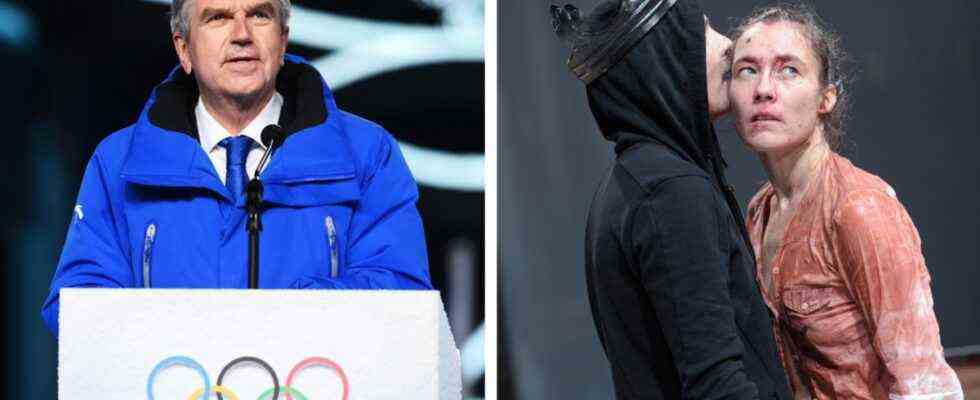Imagine this for a moment: Hamlet has just stabbed Polonius, whom he mistook for his father’s murderer, with a stab in the back. Horrified by this misunderstanding and with theater blood on his hands, Hamlet then panted to the edge of the stage and whispered to the audience: “Thank you, Merkel.” This is what it would look like if an actor were to deliver political messages during a performance. Sounds stupid? Thinks Thomas Bach too.
The President of the International Olympic Committee said on Thursday: “When an actor plays Hamlet in a theatre, no one asks whether he can express political opinions during the play.” He wanted to justify the rules of the IOC, which prohibit athletes from expressing political opinions during competitions and awards ceremonies. First of all, this is correctly observed, for a while the idea of Hamlet actors delivering political messages would be almost as surprising as a skier who brakes briefly at the Super-G to get rid of a few thoughts on climate protection.
But what does Hamlet have to do with the Super-G? And: Who is actually being wronged more here, the athletes or the actors?
What Shakespeare fan Bach wants to say is this: Hamlet sticks to the libretto and doesn’t just chatter politically in between – so please don’t disturb the performance either. The fact that he obviously thinks the athletes are role players in a big production is least surprising. Of course, in a way the Olympic Games are also gigantic theatre. There are heroes and anti-heroes here and there, little helpers with stumbles and text hangers, obediently applauding spectators who want to be entertained for their money, and always someone who runs across the field or the stage naked. With the only small difference that unfortunately not Shakespeare, but the IOC wrote the play in Beijing, which can definitely be understood as a tragedy in two senses.
Hamlet of all things cannot be staged politically
Where the comparison then falters: in the theater people constantly express themselves politically without expressing themselves politically. The selection of the material, the cast and the staging is always an expression of opinion. Actors recite rehearsed texts, they don’t freestyle around on the sidelines on EU politics, and if they do, then that too is staged. But in their roles they are always part of a great artistic approach.
Let’s stick to Hamlet. For those whose English course was a while ago: The Danish Prince Hamlet is the ultimate procrastinator in theater history, hero and anti-hero at the same time. Angry about his uncle Thomas taking power…, um: Claudius, who killed his father, Hamlet wants to kill him, but on the other hand he would rather not ascend the throne himself. The whole thing also takes place against the background of a bitter war between Denmark and Norway. By the end of Hamlet, that’s not giving anything away, pretty much everyone is dead.
Directors and actors can experiment with the material to their heart’s content and create their own tragedy. You can edit the text, turn it around, delete superfluous figures. A method that is not available to athletes. At the Munich Kammerspiele, Hamlet was staged in an appropriately abstract way as a political killer play in 2017. Hamlet then played a woman, Ophelia a man. 240 liters of theater blood were touched per performance, so much was murdered. Clear message: bloodshed is not a solution, and by the way, we are totally contemporary with our gender-fluid cast.
Hamlet is caught between inheritance obligations, political interests and his ideals. To be or not to be. So you can’t do Hamlet of all things not stage politically. People love him tenaciously, probably because he struggles like they do. And admitting doubts hasn’t done any harm either.

